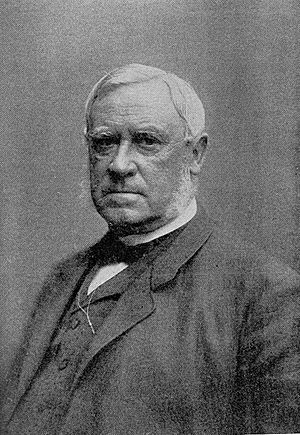Louis Gerhard De Geer facts for kids
Quick facts for kids
Louis Gerard De Geer
|
|
|---|---|
 |
|
| 1st Prime Minister of Sweden | |
| In office 20 March 1876 – 19 April 1880 |
|
| Monarch | Oscar II |
| Preceded by | Office established |
| Succeeded by | Arvid Posse |
| Minister for Justice | |
| In office 20 March 1876 – 6 June 1879 |
|
| Preceded by | Post established |
| Succeeded by | Ludvig Teodor Almqvist |
| Prime Minister for Justice | |
| In office 7 April 1858 – 3 June 1870 |
|
| Preceded by | Claës Günther |
| Succeeded by | Axel Adlercreutz |
| In office 11 May 1875 – 20 March 1876 |
|
| Preceded by | Edvard Carleson |
| Succeeded by | None |
| Personal details | |
| Born |
Louis Gerard De Geer af Finspång
18 July 1818 Finspång Castle, Sweden |
| Died | 24 September 1896 (aged 78) Hanaskog Castle, Sweden |
| Political party | Independent liberal |
| Spouse | Caroline Wachtmeister |
| Children | 6 |
| Parents | Gerard De Geer Henriette Charlotte Lagerstråle |
| Residence | Hanaskog Castle |
| Education | Linköpings Gymnasium |
| Alma mater | Uppsala universitet |
| Occupation | Statesman, lawyer |
Baron Louis Gerard De Geer (born July 18, 1818 – died September 24, 1896) was an important Swedish politician and writer. He was born at Finspång Castle in Sweden. He first worked as a lawyer. In 1855, he became the head judge for the appellate court of Götaland.
Louis De Geer served as the Prime Minister for Justice twice. The first time was from 1858 to 1870. He held this role again from 1875 to 1876. As a member of the nobility, he was part of the Swedish Riksdag of the Estates starting in 1851. Later, from 1867 to 1878, he represented Stockholm in the new Swedish Parliament, called the New Riksdag. There, he helped pass many useful new laws.
Contents
Changing Sweden's Government
De Geer's biggest success in politics was changing how Sweden's government worked. He helped create a new system where people had more say. This new system was approved by the Riksdag in December 1865. The king officially agreed to it in June 1866. After this, De Geer was very popular. He left his government job in 1870 but returned as Prime Minister for Justice in 1875.
Sweden's First Prime Minister
In 1876, Louis De Geer became the very first Prime Minister of Sweden. This happened after a big change in how the government was organized. Before, there were two main ministers: one for justice and one for foreign affairs. These roles were changed into a Minister for Justice and a Minister for Foreign Affairs, and a new top position, the Prime Minister, was created.
He served as Prime Minister until April 1880. He tried many times to solve issues about the country's weapons and military, but when he couldn't, he decided to resign. From 1881 to 1888, he was in charge of the Universities of Uppsala and Lund. He strongly believed in free trade and economic liberalism, which means he thought businesses should be mostly free from government control. Some people believe that De Geer's work helped Sweden's economy grow strongly for a hundred years, from 1870 to 1970.
His Writings
Besides his political work, De Geer was also a talented writer. He wrote several novels and essays. He also wrote important books about politics and history. His most famous work is his own story, called Minnen (which means Memories), published in 1892. This book is very important for understanding Swedish history. In it, he shared his political experiences and his thoughts from a lifetime of work. He wrote clearly and charmingly. For example, he explained that he became Prime Minister for Justice at a young age because it was hard to find someone with enough intelligence for the job among the small group of nobles at the time.
Member of Important Groups
De Geer became a member of the Swedish Academy in 1862. This is a very important group that works to improve the Swedish language and literature. In the same year, 1862, he was also chosen to be a member of the Royal Swedish Academy of Sciences. This group focuses on science and research.
Family Life
In 1848, Louis De Geer married Carolina Lovisa Wachtmeister. They had three sons. Their oldest son, Gerhard Louis De Geer (1854–1935), also became Prime Minister of Sweden later, from 1920 to 1921. Their second son, Gerard De Geer (1858–1943), became a famous geologist who studied the Earth.
Louis De Geer passed away on September 24, 1896, at his home, Hanaskog Castle in Scania. He is buried in the cemetery of Kviinge Church.
See also
 In Spanish: Louis De Geer (1818-1896) para niños
In Spanish: Louis De Geer (1818-1896) para niños

